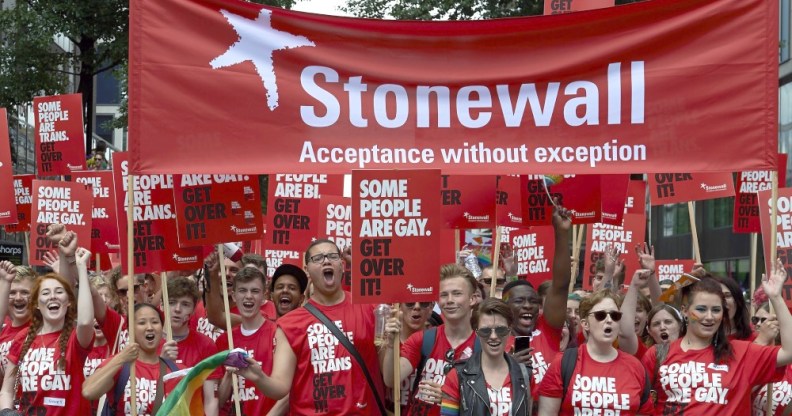No, schoolteachers haven’t been ordered to ‘avoid Stonewall’ in class

Stonewall is the UK – and Europe’s – largest LGBT+ charity. (Getty)
Stonewall has said a recent story in The Times claiming that teachers have been asked to “avoid” the charity in class is “factually incorrect”.
On Wednesday (16 February), The Times published an article with the headline: “Teachers ordered to avoid ‘biased’ views on BLM and Stonewall.”
The newspaper reported on government guidance for schools on “political impartiality” issued Wednesday (16 February), which among other things advises teachers who are teaching students about race to “avoid advocating for specific organisations that have widely contested aims or views” – widely seen to mean Black Lives Matter.
The Times, as well as The Daily Mail, also name-checked Stonewall, writing that “government sources” claimed the move is “designed to combat the politicisation of sensitive topics such as race and gender by campaign groups”.
However, the guidance mentions neither ‘gender issues’ or Stonewall.
As Stonewall stressed on Twitter, “the report doesn’t reference LGBTQ+ issues as contentious or political partisan, because they are simply not”.
The charity added: “The line of reasoning that teaching about LGBTQ+ people is ‘political’ and ‘contested’ is dangerous, and that is what led us to Section 28 in the first place.
“We must challenge this at every turn.”
Today the Department for Education @educationgovuk published new guidance for teachers on navigating political impartiality in schools, particularly focused on ‘contentious’ subjects. The guidance makes NO reference to LGBTQ+ issues as contentious.
— Stonewall (@stonewalluk) February 17, 2022
It noted that Stonewall “is signposted to in the Department for Education’s anti-bullying guidance and within the statutory RSHE guidance”.
“Teaching on LGBTQ+ inclusion is not political and is in fact required by DfE.”
The new government guidance, drawn up by the education minister Nadhim Zahwai, makes one reference to LGBT+ rights – as an example of an issue that is anything but partisan.
Teachers are advises that when discussing the decriminalisation of homosexuality, they “should not present discriminatory opposing beliefs held at the time in an uncritical manner or as acceptable in our society today”. It adds that to do so would allow pupils to “draw a clear distinction between facts and opinions and how political views can influence those opinions”.
“Teachers absolutely can talk about politics,” the guidance continues, “and they are encouraged to do so. What they shouldn’t do, though, is present their own, or anyone else’s, political views as fact.”
Stonewall said that it has lodged a formal complaint to The Times, owned by News Corp, the news publishing empire owned by Rupert Murdoch, and requested that the outlet correct the article.
A reluctance to teach about LGBT+ rights is just one of the many lasting legacies of Section 28, Margaret Thatcher’s reviled piece of legislation which banned schools and local authorities from “promoting” LGBT+ rights.
Today, one in five teachers still feel uncomfortable talking about LGBT+ issues in class, according to queer youth charity Just Like Us.
Many of the primary school teachers surveyed said despite the government rolling out inclusive regulations for teaching relationships and sex education in England, they feel hesitant teaching it, often wary of negative responses from parents.
Pupils are “constantly bombarded with cisgender, heterosexual people,” one anonymous educator said, “and pupils should be learning that LGBT+ people simply exist.”

